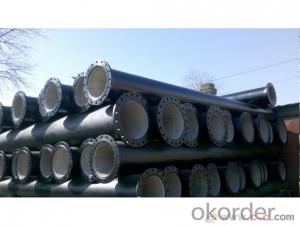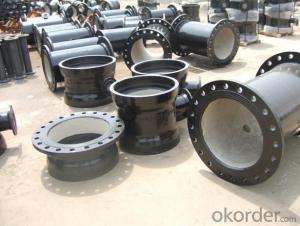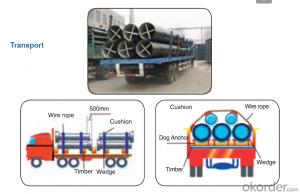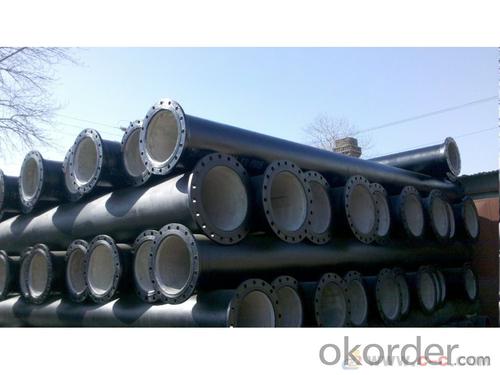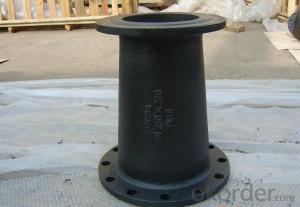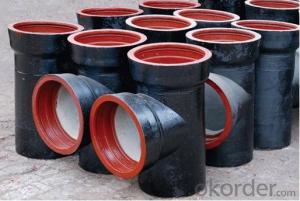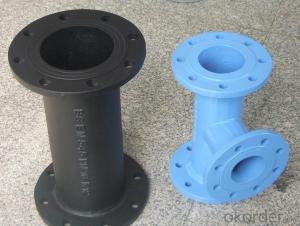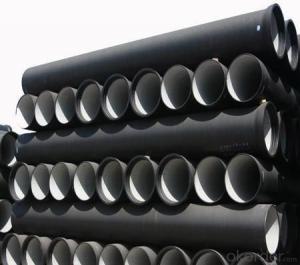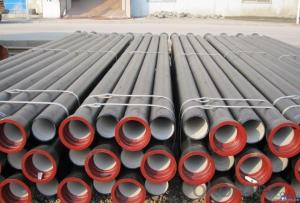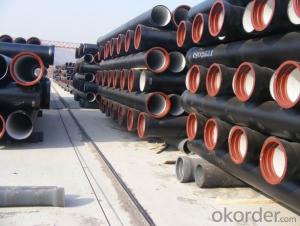Duct Iron Pipe DI Pipe Flange Pipe with Screwed ISO 2531
- Loading Port:
- Tianjin
- Payment Terms:
- TT OR LC
- Min Order Qty:
- 100 m
- Supply Capability:
- 100000 m/month
OKorder Service Pledge
OKorder Financial Service
You Might Also Like
Ductile iron pipe fittings:
Dimensions standard:
ISO2531: 50-1000mm, PN10/16
BS4772: 50-1000mm, PN10/16
EN545: 50-1000mm, PN10/16
Connecting mode:
Flanged
Socketed
Mechanical connection
Loose flanged
Coatings:
Inner lined with cement and outside coated with zinc plus bitumen
Inner and outside coated with epoxy resin
Inner and outside coated with fusion bonded epoxy resin


Quality:
ISO 2531 or EN 545 Standard K9 Class, K12 Class
1. ISO 9001 Certificate
2. ISO 2531 & EN 545 Certificate
3. WRAS Potable Water Certificate for FBE Internal Lining
4. WRAS EPDM Rubber Gasket or NBR Rubber Gasket
5. DN80mm - DN2000mm
6. Black Bitumen or Blue FBE / Epoxy Coating
7. Lengh = 6m or cut into 5.6m, 5.7m, 5.8m
8. Client's Brand Customization Allowable
9. Container or Bulk Loading / Shipping
10.Delivery within one Month or According to Client's Order Quantity
11. Support Client or The Third Party Inspection before Shipment
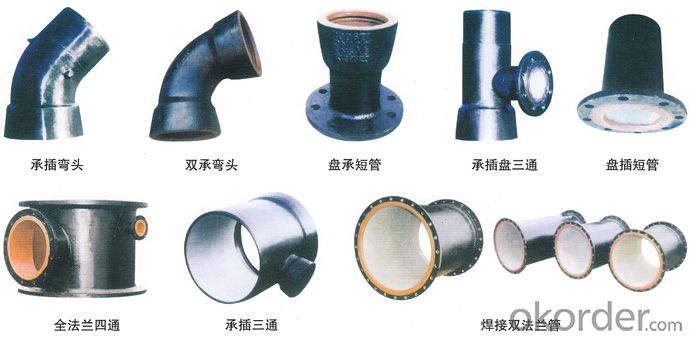
Transport:
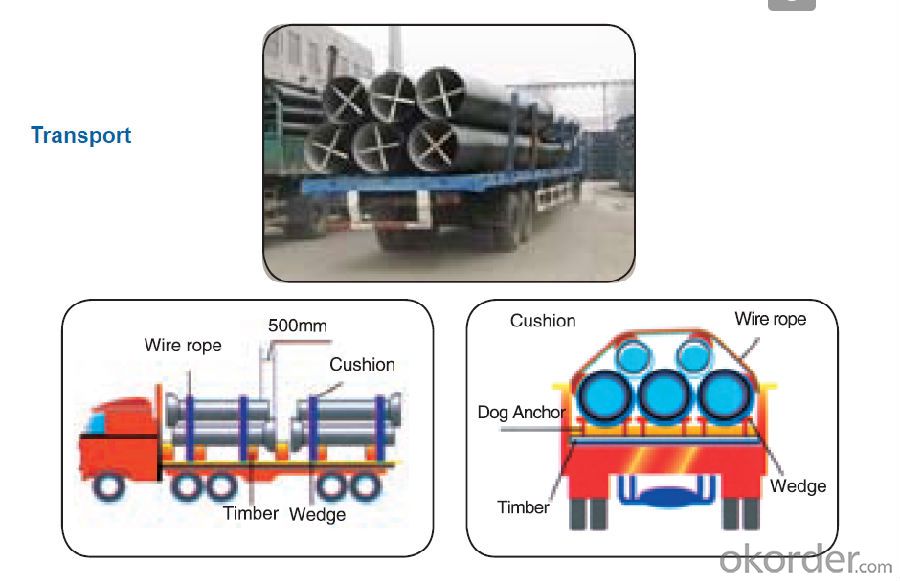
- Q: Ways of connecting ductile iron pipes
- In our country, the national standards stipulated annealing, centrifugal casting, water delivery with ductile iron, straight pipe, pipe fittings, aprons and other technical requirements, China's production of ductile iron pipe products must meet the current national standards.
- Q: What is the cost of ductile iron pipes compared to other materials?
- The cost of ductile iron pipes is generally higher compared to other materials such as PVC or HDPE. While the upfront cost may be higher, ductile iron pipes are known for their durability, longevity, and resistance to damage, making them a cost-effective choice in the long run.
- Q: How are ductile iron pipes protected against internal scaling or buildup?
- Ductile iron pipes are protected against internal scaling or buildup through the use of various coatings and linings. One commonly used method is cement mortar lining, where a layer of cement mortar is applied to the inner surface of the pipe to prevent scaling and corrosion. Additionally, epoxy coatings are also utilized, which provide a smooth and protective layer that inhibits the formation of scale and buildup. These protective measures help to ensure the longevity and efficiency of ductile iron pipes in various applications.
- Q: Are ductile iron pipes suitable for fire protection systems?
- Yes, ductile iron pipes are suitable for fire protection systems. Ductile iron is a strong and durable material that can withstand high pressure and temperature fluctuations, making it ideal for fire protection systems that require reliable and long-lasting pipes. Additionally, ductile iron has excellent corrosion resistance, which helps to prevent the degradation of the pipes over time, ensuring the integrity of the fire protection system. The high tensile strength of ductile iron also provides added safety benefits as it can withstand the stress and strain that may occur during a fire event. Therefore, ductile iron pipes are a suitable and commonly used material for fire protection systems in various applications, including commercial buildings, industrial facilities, and residential areas.
- Q: Can ductile iron pipes be used for slurry transportation?
- Yes, ductile iron pipes can be used for slurry transportation. Ductile iron pipes are known for their high strength and durability, making them suitable for various applications including slurry transportation. Slurry is a mixture of solid particles and a liquid, which can be abrasive and corrosive. Ductile iron pipes have excellent resistance to abrasion, corrosion, and erosion, making them capable of handling the challenges posed by slurry transportation. Additionally, ductile iron pipes offer a smooth inner surface, reducing friction and improving the flow of slurry. Therefore, ductile iron pipes are a reliable choice for slurry transportation systems in industries such as mining, wastewater treatment, and oil and gas.
- Q: Are ductile iron pipes resistant to alkaline attacks?
- Yes, ductile iron pipes are generally resistant to alkaline attacks. Ductile iron is known for its durability and corrosion resistance, making it suitable for various applications including water and wastewater systems. Alkaline substances, such as high pH levels in water or chemicals, can potentially cause corrosion in certain metals, but ductile iron has been specifically designed to withstand these conditions. Its composition, including the addition of alloying elements like nickel and chromium, enhances its resistance to alkaline attacks. Additionally, ductile iron pipes are often lined with protective coatings, such as cement mortar or polyethylene, further enhancing their resistance to alkaline substances. However, it is important to note that the specific resistance of ductile iron pipes to alkaline attacks can depend on factors such as the concentration and duration of exposure to alkaline substances, as well as the presence of other corrosive agents. Therefore, it is always advisable to consult with manufacturers or industry experts to ensure the suitability of ductile iron pipes for specific alkaline environments.
- Q: What is the expected deflection of ductile iron pipes under load?
- The expected deflection of ductile iron pipes under load can vary depending on several factors such as the diameter, wall thickness, material properties, and the magnitude and distribution of the load applied. Generally, ductile iron pipes have a relatively high resistance to deflection due to their inherent strength and durability. They are designed to withstand substantial loads and are often used in applications where high pressure and heavy loads are expected. To determine the expected deflection, engineers typically use structural analysis techniques such as finite element analysis or beam theory calculations. These methods take into account the specific geometry and material properties of the ductile iron pipe to predict its behavior under load. In practice, ductile iron pipes are designed with a certain maximum allowable deflection, which is usually specified by industry standards or local regulations. This maximum allowable deflection ensures that the pipe remains structurally sound and maintains its functionality. It is important to note that the expected deflection of ductile iron pipes can also be influenced by external factors such as soil conditions, installation methods, and changes in temperature. Therefore, proper installation techniques and adherence to industry guidelines are crucial to ensure the pipes perform as expected and meet the required deflection limits.
- Q: The difference between ductile iron pipe and steel pipe used in pipe jacking
- The casting processes of nodular cast iron pipes are continuous casting, hot die casting and water-cooled centrifugal casting, in which water cooling is the most advanced process in the world,
- Q: Can ductile iron pipes be used for marine applications?
- Yes, ductile iron pipes can be used for marine applications. Ductile iron is known for its high strength and durability, making it suitable for various environments, including marine environments. It has excellent corrosion resistance properties, which enable it to withstand the harsh conditions of saltwater exposure. Additionally, ductile iron pipes have been used in marine applications such as wastewater treatment plants, desalination plants, and offshore platforms. However, it is important to consider proper coating and maintenance to enhance the longevity of ductile iron pipes in marine applications.
- Q: Do ductile iron pipes require external protection against stray electrical currents?
- Ductile iron pipes indeed necessitate external safeguarding against stray electrical currents. The presence of such currents can induce corrosion in the pipes, resulting in premature failure and probable leakage. To counteract this, protective coatings or wraps are employed on the ductile iron pipes, creating a shield between the pipes and the electrical currents. This safeguarding measure guarantees the durability and dependability of the pipes, warding off expensive repairs and potential safety risks.
Send your message to us
Duct Iron Pipe DI Pipe Flange Pipe with Screwed ISO 2531
- Loading Port:
- Tianjin
- Payment Terms:
- TT OR LC
- Min Order Qty:
- 100 m
- Supply Capability:
- 100000 m/month
OKorder Service Pledge
OKorder Financial Service
Similar products
Hot products
Hot Searches
Related keywords
